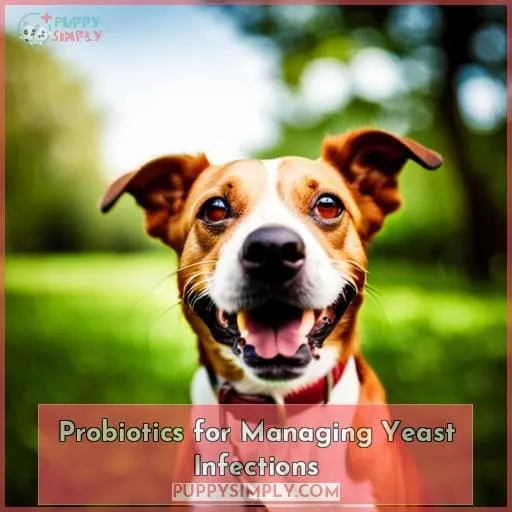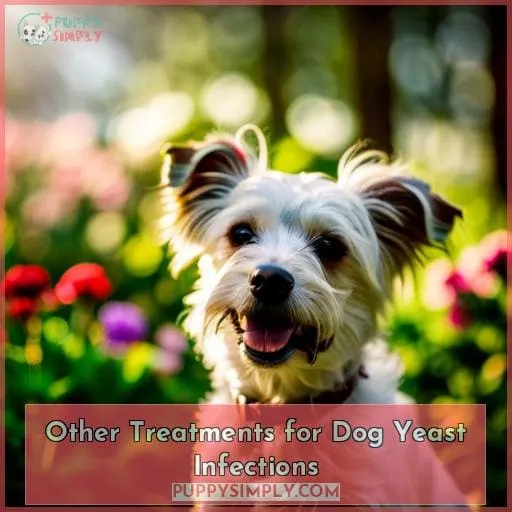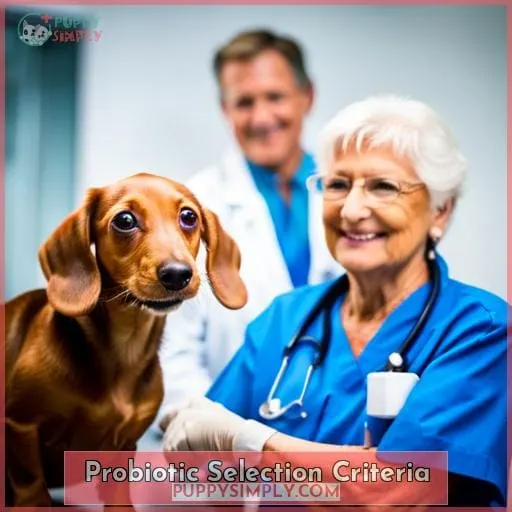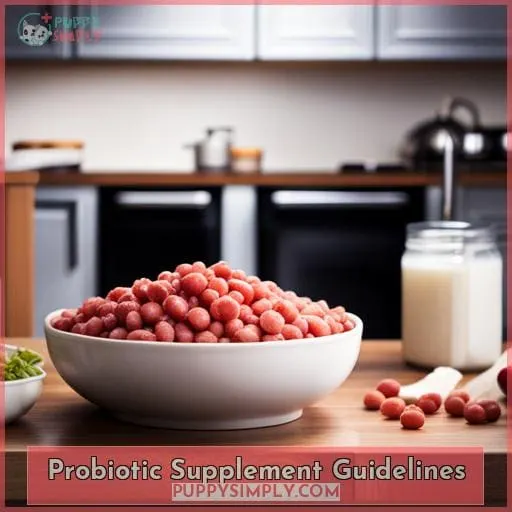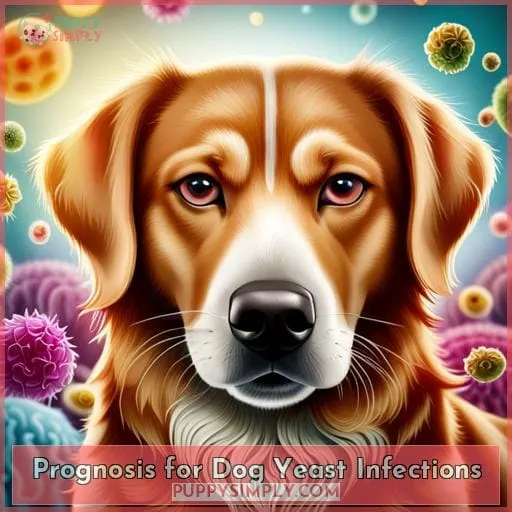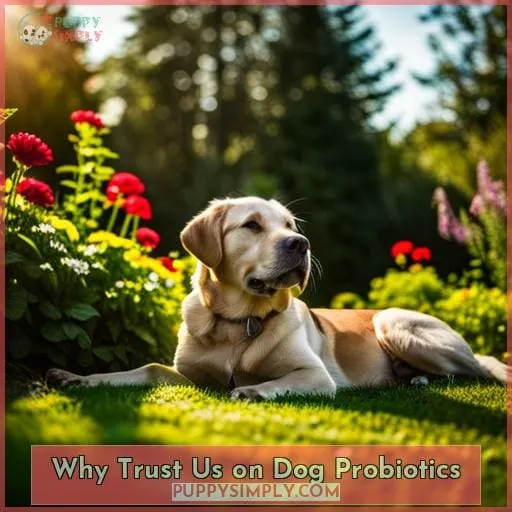This site is supported by our readers. We may earn a commission, at no cost to you, if you purchase through links.
 Oh doggone it, that pesky yeast has struck again! Your poor pup’s paws are pink, her skin is irritated, and her ears just won’t stop itching. No need to call the vet just yet – hand over your credit card and let Dr. Google examine the case.
Oh doggone it, that pesky yeast has struck again! Your poor pup’s paws are pink, her skin is irritated, and her ears just won’t stop itching. No need to call the vet just yet – hand over your credit card and let Dr. Google examine the case.
You’ll quickly find every home remedy, essential oil, and probiotic supplement promising a cure.
Take a deep breath and step away from the online shopping cart. This guide will walk you through the research on probiotics for dogs with yeast infections. Applying the latest scientific evidence with compassion and care, we’ll discuss the best strains, potency, and delivery methods to gently restore your dog’s microbiome balance.
You and Fido will be back on your walk in no time. Now, let’s dig in!
Table Of Contents
- Key Takeaways
- Top 10 Probiotics for Dog Yeast Infections
- 1. Petaxin Dog Probiotic Supplement
- 2. Purina ProPlan Vet Diets FortiFlora Dog Supplement
- 3. Zesty Paws Probiotics for Digestive Health Dog Chews
- 4. Native Pet Vet Formulated Probiotic Prebiotic Powder Dog Supplement
- 5. Nutri Vet Digestive Prebiotics Probiotics Dog Supplement Soft Chews
- 6. PetLab Probiotic Pork Flavored Soft Chews Digestive Supplement Dogs 30 Count
- 7. Fera Pet Organics Probiotics Prebiotics for Dogs Cats
- 8. Herbsmith Microflora Digestion Capsules Dog Cat Supplement
- 9. Soothing Hydrating Itchy Skin Dog Cat Shampoo
- 10. Honest Kitchen Daily Boosters Goats Milk Probiotics Dog
- What Causes Yeast Infections in Dogs?
- Probiotics for Managing Yeast Infections
- Other Treatments for Dog Yeast Infections
- Vet Consultation Recommended
- Probiotic Selection Criteria
- Probiotic Supplement Guidelines
- Prognosis for Dog Yeast Infections
- Why Trust Us on Dog Probiotics
- Conclusion
Key Takeaways
- Probiotics can help restore balance to a dog’s microbiome and digestive health to fight yeast overgrowth.
- Choose a veterinarian-recommended probiotic made for dogs with strains like Bifidobacterium and Lactobacillus in an effective dosage.
- Gradually introduce the probiotic, adjusting the dosage based on the dog’s response and tolerance.
- Use probiotics as part of a holistic approach to managing yeast infections in dogs, along with dietary changes, medications, and natural supplements if necessary.
Top 10 Probiotics for Dog Yeast Infections
When treating yeast infections in dogs, probiotics can help restore balance to the microbiome and digestive health. This guide covers some of the top probiotic supplements to consider for managing yeast overgrowth and supporting your dog’s gut health, such as Petaxin Dog Probiotic Supplement and Purina ProPlan FortiFlora.
Some key things to look for when selecting a dog probiotic include high CFU counts for effectiveness, strains that are dog-specific for optimal results, and supplements that contain saccharomyces boulardii for preventing yeast overgrowth.
Refrigerated options may provide higher potency as well. Consulting with your veterinarian can help determine the right probiotic supplement, dosage, and treatment duration for your dog’s needs.
Regularly giving a quality probiotic can help reduce yeast levels while also promoting healthy digestion and nutrient absorption. When used alongside an anti-fungal medication, probiotics may help shorten treatment time.
However, probiotics should not replace veterinary prescribed medications for treating active infections. Overall, probiotic supplements can be a useful tool for both managing and preventing fungal overgrowth in dogs when used properly.
1. Petaxin Dog Probiotic Supplement
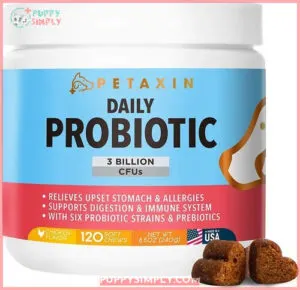
Petaxin’s comprehensive digestive health supplement can relieve your pup’s gas, constipation, diarrhea, and allergies while supporting their digestion, immunity, and energy levels. This USA-made, non-GMO supplement contains 3 billion CFUs of 6 probiotic strains plus 2 prebiotics to promote gastrointestinal and immune function.
Reviews show it improves dogs’ digestion, reduces itching and paw licking, and has an overall positive impact, though some dogs may dislike the taste.
- Comprehensive formula with 6 probiotic strains and 2 prebiotics
- 3 billion CFUs per serving
- Supports digestion, immunity, energy
- Relieves gas, diarrhea, constipation
- Improves allergy symptoms
- Made in the USA
- Non-GMO, grain-free
- Positive customer reviews
- Some dogs may dislike the taste
- Must give daily for optimal results
- Not a replacement for medical treatment
2. Purina ProPlan Vet Diets FortiFlora Dog Supplement
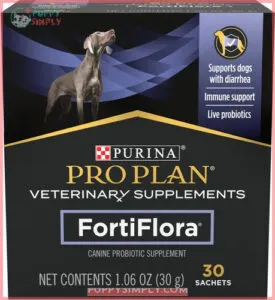
Fortiflora’s microencapsulated probiotics can effectively manage your pup’s digestive distress and diarrhea while strengthening their intestinal health. This vet-recommended supplement contains antioxidants and live microorganisms that promote intestinal balance.
By restoring populations of beneficial gut bacteria, it helps relieve symptoms of diarrhea and loose stools in puppies and adult dogs. The microencapsulation tech protects the probiotics from stomach acid for enhanced efficacy.
Fortiflora has a palatable liver flavor that most dogs readily accept when sprinkled on food or dissolved in water.
Numerous pet owners have seen improvements in their dogs’ stool quality and digestive health while using this supplement. However, it’s best to consult your veterinarian before starting FortiFlora, especially for dogs with underlying conditions.
- Relieves diarrhea and loose stools
- Contains probiotics and antioxidants
- Stabilized for effectiveness
- Palatable liver flavor
- Vet recommended
- Improves stool consistency
- Increased urgency to go outside
- High price per serving
- Consult vet before use
- Decreased product quantity
3. Zesty Paws Probiotics for Digestive Health Dog Chews
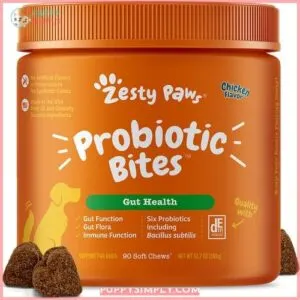
Zesty Paws’ pumpkin-flavored probiotic chews help manage your pup’s gastrointestinal health and urinary problems, though they’re not palatable for every dog. These chews contain probiotics like Bacillus subtilis to support digestion and may relieve issues like constipation, gas and indigestion.
Many customers reported benefits for dogs’ stool consistency, allergies and urinary control. However, some dogs disliked the taste while others experienced vomiting or diarrhea.
- May improve gastrointestinal and urinary health
- Positive effects on stool, allergies, UTIs
- Supports healthy digestion and immunity
- Caused vomiting/diarrhea in some dogs
- Taste not appealing for all dogs
- Mixed experiences based on reviews
4. Native Pet Vet Formulated Probiotic Prebiotic Powder Dog Supplement
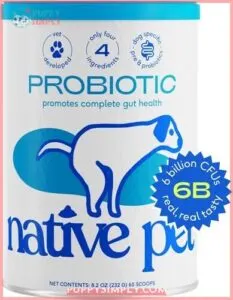
Try Native Pet – with mixed reviews on diarrhea relief, it may shake things up in your dog’s gut health. This vet-formulated probiotic and prebiotic powder aims to promote digestion and skin health in dogs.
Made of all-natural ingredients, it can be easily sprinkled on food. While some users report success with upper GI issues and bowel regulation, others note diarrhea and lack of results.
- Vet-formulated
- All-natural ingredients
- Easy to administer on food
- Some dogs see benefits for digestion
- Helps with gas and stool quality
- Cost-effective
- Caused diarrhea in some dogs
- May not see results in all dogs
- Can take time to take effect
- Powder form less convenient than chews
- Requires mixing into food
5. Nutri Vet Digestive Prebiotics Probiotics Dog Supplement Soft Chews
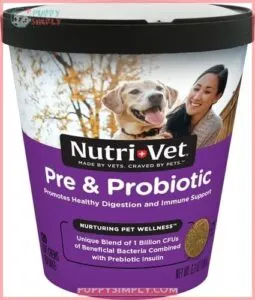
You’ll feel at ease knowing these soft chews are supporting your pup’s digestion. Nutri Vet Digestive Soft Chews contain 1 billion CFUs of live beneficial cultures like Lactobacillus acidophilus to promote proper intestinal microflora.
They also have prebiotic inulin to stimulate growth of good bacteria in the GI tract.
Multiple studies confirm that blends of probiotics and prebiotics help improve stool quality, nutrient absorption, and immune function in dogs prone to digestive issues or yeast overgrowth.
These chicken-flavored chews provide a tasty, convenient way to support your dog’s digestive system.
- Vet-recommended probiotic strains
- Prebiotics to boost good gut bacteria
- Tasty soft chew format
- Good for senior and puppy dogs
- Possible hardness in cold weather
- May initially cause mild bloating
6. PetLab Probiotic Pork Flavored Soft Chews Digestive Supplement Dogs 30 Count
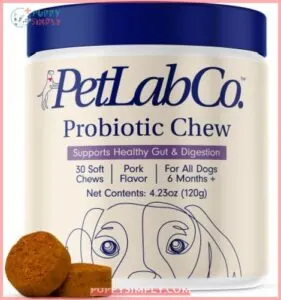
Wouldn’t these soft chews with delicious pork flavor tempt your best friend to a happier gut? These chews contain 8 strains of probiotics to support digestion and maintain gut flora in dogs. Made in the USA, they provide enzymes, vitamins, minerals, and antioxidants to improve gut health.
While some dogs showed benefits, others lost interest or experienced no change. One case of nausea was reported, so monitor your dog.
- Contains probiotics and nutrients for digestion
- Pork flavor dogs tend to enjoy
- Some dogs showed positive effects
- Made in the USA
- May lose appeal for some dogs over time
- Not effective for every dog
- Potential for adverse effects like nausea
- Can become stale if not used quickly
7. Fera Pet Organics Probiotics Prebiotics for Dogs Cats
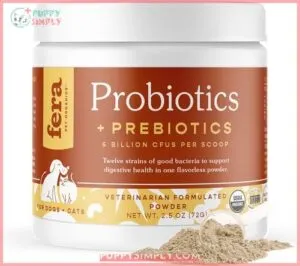
Balancing your pup’s microbiome boosts their wellbeing with Fera Pet Organics Probiotics. This flavorless powder supports gastrointestinal health in dogs and cats by introducing twelve probiotic strains and five billion colony forming units.
Simply sprinkle over food for easy use. Customers report digestive improvements in pets prone to issues like diarrhea. The grain, soy, and dairy-free formula provides a healthy intestinal environment and may reduce loose stool.
- 12 probiotic strains
- 5 billion CFUs
- Supports digestion
- Ease of use
- May not work for all pets
- Long-term use may be needed
- Can be pricey
8. Herbsmith Microflora Digestion Capsules Dog Cat Supplement
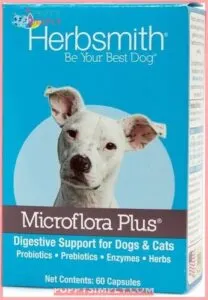
This moisture-sealed herbal probiotic capsules’ holistic formula supports your pup’s digestion and gut health. Developed by veterinarian Dr. Chris Bessent, it contains a blend of probiotics to populate the GI tract with beneficial microorganisms, prebiotics to feed those microbes, digestive enzymes to break down nutrients, and herbs to maintain healthy bowel function.
The NASC-certified, full-spectrum ingredients come in easy-to-use capsules that you can mix into your dog or cat’s food.
Customer reviews indicate it firms stool, provides an energy boost in older pets, relieves GI issues like gas and diarrhea, and improves allergic symptoms. The capsules are vet recommended for supporting digestion across all life stages from puppy to senior.
- Vet-formulated for optimal digestive health
- Effective for various GI and bowel problems
- Boosts energy levels in aging pets
- Eases gas, bloating, diarrhea
- Supports nutrient absorption
- Improves allergies
- Can cause loose stool initially
- Not all pets like the taste
- Expensive compared to other probiotics
- Small capsules may be hard for some pets to swallow
9. Soothing Hydrating Itchy Skin Dog Cat Shampoo
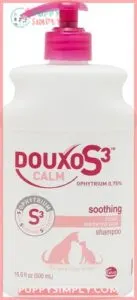
You’re itching for a shampoo that’ll provide sweet relief for your pup’s yeasty skin without harsh ingredients. Veterinarian-recommended Soothing Hydrating Itchy Skin Dog Cat Shampoo leverages natural Ophytrium to strengthen the skin barrier and restore microbial balance in irritated skin.
This gentle, sulfate-free formula hydrates, cleanses, and medicates skin showing signs of yeast overgrowth like itching, foul odor, and redness.
Multiple reviewers noted reduced itching and improved coat luster after beginning use. As an alternative to products like Malaseb, this shampoo soothes troubled skin while leaving a clean scent.
Gentle on skin yet tough on yeast, Soothing Hydrating Itchy Skin Dog Cat Shampoo is an effective medicated shampoo for providing relief.
- Veterinarian recommended
- Leverages natural Ophytrium
- Sulfate-free gentle formula
- Reduces itching and odors
- Improves skin and coat
- Alternative to Malaseb
- Possible skin tag growth
10. Honest Kitchen Daily Boosters Goats Milk Probiotics Dog
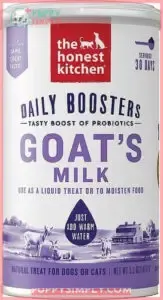
Give your dog the treat of healthy digestion by sprinkling The Honest Kitchen’s goat milk probiotics over their kibble. This powdered probiotic supplement supports immune health and digestion in dogs of all ages and breeds.
It contains 1.25 billion active probiotics and digestive enzymes to improve nutrient absorption. Made from highly digestible goat’s milk, it’s easy to mix into food or water. Users report benefits like reduced gas, allergy relief, and shinier coats.
As a human-grade formula free of GMO ingredients, it receives positive feedback. However, the bottle’s small quantity means it can get pricey for daily use. Some dogs may not take to the taste.
- Supports immune and digestive health
- 1.25 billion active probiotics
- Made with highly digestible goat’s milk
- Easy to mix into food or water
- Reported benefits for skin, coat, gas
- Free of GMO ingredients
- Human-grade formula
- Can get expensive for daily use
- Small bottle size
- Some dogs may dislike the taste
What Causes Yeast Infections in Dogs?
Yeast infections can arise when there’s an overgrowth of yeast in your dog’s body. This overgrowth is often caused by an imbalance in your dog’s system, allowing yeast fungi like Malassezia to multiply rapidly.
- Excessive antibiotic use, which depletes beneficial bacteria needed to keep yeast in check.
- Issues with the immune system that make it harder for your dog to fight off infections.
- Allergies that cause inflammation and allow yeast to thrive.
- An excess of starch and sugars in your dog’s diet, providing nourishment for yeast overgrowth.
- Hot and humid environmental conditions that promote yeast proliferation, especially in skin folds.
If your dog’s exhibiting any symptoms such as skin irritation, head shaking, or foul odors, consult your vet, as they can diagnose the underlying cause and provide proper treatment, which may include probiotics and antifungals.
Maintaining a healthy diet and lifestyle can also help prevent yeast overgrowth.
Incorporate preventive measures, consult your vet, and give your dog the best chance at defeating troublesome yeast infections. Through diligent care and probiotic balance, your canine companion’s health and comfort can be restored.
Probiotics for Managing Yeast Infections
Proper probiotic selection supports your dog’s microbiome and bolsters their defenses against yeast overgrowth. Effective probiotics can help restore balance in your dog’s intestinal tract and crowd out harmful yeast.
But probiotics should complement, not replace, traditional treatments for yeast infections. Consult your veterinarian on the appropriate probiotic strains and dosage for your dog’s condition. Some proven strains include Lactobacillus, Bifidobacterium, and Enterococcus. Ensure the product meets quality standards with guaranteed potency to expiration.
Probiotics can reduce antibiotic side effects and support immunity, but make dietary changes too and address underlying causes of yeast overgrowth like allergies or improperly functioning immune systems.
Though promising, more research is still needed to confirm probiotics’ effectiveness against yeast infections in dogs specifically. But as part of a comprehensive approach, probiotics may strengthen your dog’s defenses and promote long-term well-being.
Other Treatments for Dog Yeast Infections
Alongside probiotics, you’ll want to consider topical treatments, medications, diet changes, and supplements to fully address your pup’s yeast troubles. For example, an antifungal shampoo can help relieve itchy skin while an anti-yeast diet reduces sugars that feed the infection.
Here are 5 ways to approach treatment:
- Dietary changes like avoiding sugars, grains, carbohydrates
- Medicated shampoos, wipes, ear cleaners
- Oral and topical antifungal medications
- Natural supplements like oregano oil, coconut oil, probiotics
- Managing allergies and skin inflammation
A multi-faceted approach works best for clearing yeast overgrowth in dogs. Consult your vet for products and dosages tailored to your dog’s needs. With diligence and patience, you can get your pup’s yeast under control and their health back on track.
Vet Consultation Recommended
Witnessing recurring symptoms should signal it’s time to see the veterinarian. Your dog’s health and comfort are top priority. While quality probiotics offer promise, it’s best to get a proper diagnosis and treatment plan from your trusted vet.
With their expertise, you can coordinate probiotics into a holistic care approach. Don’t delay – untreated infections risk worsening. Together with your vet, determine the ideal probiotics and dosing for your dog’s needs.
| Cause | Treatment |
|---|---|
| Allergies | Antihistamines, diet change |
| Skin Infections | Antifungal shampoos, topicals |
| Ear Infections | Ear cleaners, medications |
| Gut Dysbiosis | Probiotics, prebiotics |
| Antibiotics | Probiotics, diet change |
| Weak Immunity | Probiiotics, lysine |
| Hormone Imbalance | Spay/neuter |
While quality probiotics show promise for promoting gut health and controlling yeast overgrowth through beneficial bacteria, it’s best to consult your veterinarian for proper diagnosis, treatment recommendations, and guidance on selecting the right probiotic product and dosage for your dog’s needs.
Probiotic Selection Criteria
When selecting a probiotic for your dog’s yeast infection, it’s crucial to choose a product containing strains that are canine-specific and proven to benefit dogs. Additionally, potency, delivery method, and shelf life are key factors, as the number of viable bacteria can decrease over time.
Dog-Specific Strains Needed
You’re going to want to aim for dog-specific bacteria like Bifidobacterium and Lactobacillus when shopping for probiotics, as studies have shown 70% of general probiotic strains don’t even colonize a dog’s GI tract.
Indeed, canine-specific probiotic strains are scientifically proven to reach and populate the canine intestinal tract effectively. This allows them to confer health benefits like improved digestion, balanced gut bacteria, and yeast control.
Dog probiotics with strains like Enterococcus faecium and Bacillus coagulans are preferable over human probiotic strains. Ensure any probiotic contains dog-targeted bacteria for combating yeast infections.
– Product Potency Important
As you’re selecting dog probiotics for yeast, ensure the product potency is high enough to provide adequate CFUs.
- Look for at least 2 billion CFUs per serving or higher for a therapeutic effect against yeast overgrowth.
- Ensure the product lists CFUs at time of manufacture to confirm viable bacteria counts.
- Check credibility and testing behind CFU counts.
- Avoid inactive, expired, or low-potency probiotic products.
When assessing probiotic potency for dogs, higher CFU counts indicate more beneficial bacteria to counteract yeast imbalance. Verify viable bacteria through recent CFU testing by reputable brands. Subpotent or mislabeled products won’t provide the intended therapeutic benefits.
Probiotics require proper handling and storage to maintain bacterial viability. Follow dosage guidelines for optimal results.
– Delivery Method Matters
Your dog’s mouth craves the savory taste of probiotics’ succulence. When choosing probiotics’ delivery method for treating yeast overgrowth, consider the dosage, convenience, and your dog’s preference.
Probiotics come in powder, chewable tablet, capsule, liquid, or paste forms. Powders allow precise dosage and can mix into food easily. Chewables provide accurate doses and appeal to dogs. Capsules need hiding in food but offer controlled amounts.
Liquids are readily consumed but dosing can be imprecise. Pastes allow customizable dosing, though some dogs dislike the texture. Choose a delivery method aligning with your dog’s temperament and your treatment approach for managing yeast overgrowth.
Probiotic Supplement Guidelines
Though downplaying symptoms, carefully observe your dog’s response when starting probiotics.
Start with a low dose and gradually increase over 2-3 weeks. This allows the dog’s gut to adjust and minimizes side effects.
Give probiotics on an empty stomach or at least 2 hours away from food for better absorption.
Store probiotics properly to maintain potency. Refrigerate capsules and powders. Avoid heat exposure.
Use probiotics consistently. Sporadic use may not provide full benefits. However, take occasional breaks to avoid dependence.
Note effects on energy, stool, skin, digestion, immunity. Increase dose if minimal benefits. Stop immediately if adverse reactions occur like vomiting or diarrhea. Monitor closely and consult your vet if concerns arise when administering probiotics.
With patience and care, your dog can gain the wellness benefits of probiotic supplements.
Prognosis for Dog Yeast Infections
Since yeast infections in dogs can be challenging to manage, their prognosis really depends on the severity and any underlying conditions or triggers. To determine prognosis, your vet will consider factors like the type of yeast, affected areas, chronicity, and response to initial treatment.
Mild localized infections often respond well to topical antifungals and probiotics. More severe or recurrent yeast infections may require oral antifungals and antimicrobials alongside probiotics to restore gut health.
Preventive measures like flea control, allergy management, and probiotics can help avoid recurrences.
Prognosis is generally good if treated promptly, but lifelong management is sometimes needed for dogs prone to yeast overgrowth. Partnering with your vet to find the right combination of probiotics, natural remedies, and conventional treatment provides the best chance of resolving yeast infections and improving your dog’s quality of life.
Why Trust Us on Dog Probiotics
Many pet owners struggle with finding a high-quality probiotic for their dogs. You can trust our recommendations because we are committed to providing only the most effective and safest options for your beloved canines.
Our selections are based on four key factors:
- Ingredients – we evaluate the strains of bacteria, CFU counts, quality control, and manufacturing practices.
- Clinical evidence – we look for proven results backed by veterinary research.
- Customer feedback – we comb through user reviews analyzing real-life experiences.
- Brand integrity – we ensure brands meet stringent standards and share our values.
With your dog’s health as our top priority, you can feel confident our probiotic suggestions will support their overall well-being and provide relief from yeast infections and other ailments.
Conclusion
2023 Vet Choices:
Like a vigilant guardian watching over your pup’s gut health, probiotics diligently balance yeast overgrowth. When deploying these beneficial reinforcements to combat harmful fungi, arm yourself with veterinary insights.
Carefully choose potent, dog-specific products to mitigate infections. Although probiotics alone cannot conquer yeast, their prudent use alongside proven treatments furthers wellbeing. Ultimately, your dog’s victory depends on an integrative approach that nourishes immunity and restores microbial harmony.
Collaborate with your trusted vet so probiotics can bolster your pup’s defenses.


